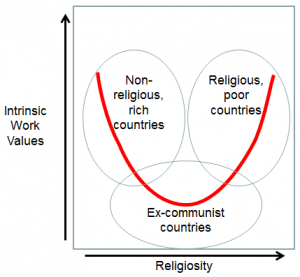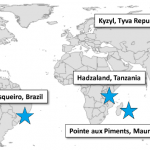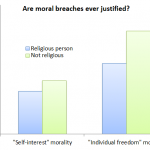
One of the seminal pieces of research on religion and society was done in the early 20th century by a guy named Max Weber, who concluded that what he called the ‘Protestant Work Ethic’ helped explain why the countries of Northern Europe and America were so prosperous. It’s a provocative conclusion that later research has shown was something of an oversimplification (see The Protestant ‘Work-Shy’ Ethic?, for example), but still it’s enormously influential.
Hamid Yeganeh, at Winona State University, Minnesota wanted to know whether the strength of religious conviction, as well as the particular strain of belief, was important. But in particular, he wanted to know if religious belief affected extrinsic and intrinsic work values differently.
Extrinsic work values, according to Yageneh, include placing high value on “external and material rewards such as pay, holiday, promotion, and working conditions”. Intrinsic work values, on the other hand, include all those internal benefits like self-actualization, achievement, social responsibility and competence.
Now, what Yageneh was interested in was cultural values. So he looked at data from the World Value Survey from 72 countries, aggregating the survey scores for each country.
What we’re looking at, then, is whether countries with lots of religious people in them also have people with different work values, on average. We’re not looking at whether religious people themselves have different work values. It’s a subtle difference, but one worth understanding.
What he found was that people in religious countries are more strongly motivated by extrinsic work values. The same went for people in poorer countries, unsurprisingly (since if you are poor then pay and security are, of course, vital), and ex-communist countries. China was an outlier, due, Yageneh suggests, to its rapid development in recent times.
Even taking that into account, however, religion still shone through. People in religious countries really value material rewards from the work.
 The relationship with intrinsic work values was a bit more complicated. As shown in the figure it peaked at high and low levels of national religiousness, with a low point in the middle – basically where the ex-communist countries lie.
The relationship with intrinsic work values was a bit more complicated. As shown in the figure it peaked at high and low levels of national religiousness, with a low point in the middle – basically where the ex-communist countries lie.
What could explain all this? Well here’s what Yageneh has to say:
… religiosity is associated with traditional or conservative cultural values such as deference to authority, collectivism, and family security. As such, religiosity tends to encourage the extrinsic work values which express conservation values rather than inquisitiveness and autonomy.
Similarly, communist rule restricts human autonomy and diminishes the workers to passive cogwheels deprived of individual motivation, sense of achievement, personal responsibility, and ambition. Under these circumstances, the self-actualization aspects of the job are neglected or repressed and the extrinsic work values such as pay, holiday, and working conditions, receive more attention.
In short, religion and communism both may promote an ethic that stresses the monetary value of what you produce, rather than doing work that satisfies you as an individual.
And the Protestant work ethic? Well Yageneh found no evidence of it. All religions were the same.
![]() Yeganeh, H. (2015). Religiosity, socio-economic development and work values: a cross-national study Journal of Management Development, 34 (5), 585-600 DOI: 10.1108/JMD-06-2014-0066
Yeganeh, H. (2015). Religiosity, socio-economic development and work values: a cross-national study Journal of Management Development, 34 (5), 585-600 DOI: 10.1108/JMD-06-2014-0066















